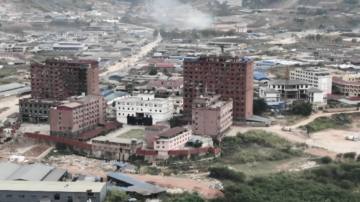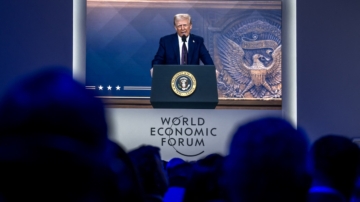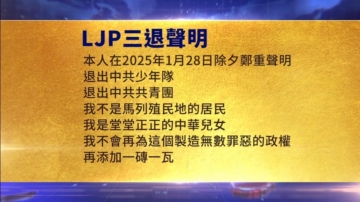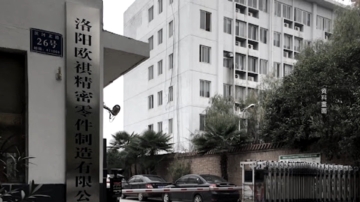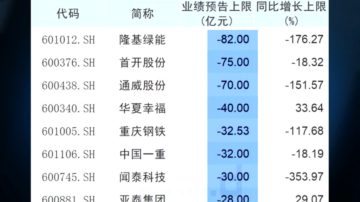【新唐人2014年05月10日訊】中國大陸各地血案頻發,恐襲陰霾籠罩全中國,各地再次提升反恐維穩級別。日前中共公安部正、副部長罕見的分頭到北京和上海、長沙巡查安保工作,副部長傅政華要求民警要爭分奪秒,練就「一槍制敵」的本領。評論認為,如果中共不改變對老百姓的高壓政策,只是以暴治暴,將引發更多暴力事件的發生。
5月8號,中國再次發生砍人事件,江西黎川縣一名女子在超市門前,手持長刀,連砍多人,其中4人被砍傷送院。
在這之前,雲南昆明、新疆烏魯木齊、廣州三大火車站也接連發生暴力襲擊事件。
5月6號,廣州火車站發生的砍人事件,造成6人受傷;4月底,烏魯木齊火車站發生爆炸,造成3死,70多人傷;3月1號,昆明火車站砍人血案,有29人死,140多人受傷。
接連發生的暴力襲擊事件,令全中國襲罩在恐襲陰霾中,中共總書記習近平在新疆訪問期間強調,要把所謂「暴恐分子」的囂張氣燄打下去;中共政法委書記孟建柱也宣佈,將展開打擊暴恐的專項行動,「出重手、下重拳」先發制敵。
同時各地也全面提升反恐維穩級別,中共公安部正、副部長,在廣州火車站砍人案發當晚,罕見的連夜出動。
在此之前,中共公安部長郭聲琨6號晚出現在長沙火車站,檢查車站及周邊警力及安保部署;副部長劉彥平則趕赴上海火車站、虹橋樞紐和蘇州火車站落實反暴、反恐措施。
當晚,另一名公安部副部長傅政華,也出現在北京火車站等重點區域,進行武裝巡邏。傅政華還要求民警:「遇到突發事件,槍法好很重要,要練出能夠一槍制敵的好槍法。」
7號開始,各地民警開展反恐訓練,學習「一槍制敵」的本領。
大陸「權利運動」組織發起人胡軍指出,現在中國民間對抗越來越激烈,中共借反恐為名訓練民警「一槍制敵」,其實就是「一槍斃敵」的直接殺人滅口。
大陸《權利運動》發起人胡軍:「它現在開始把每一個老百姓定為恐怖份子,它們隨時根據它們的需要,隨時可以擊斃,從雲南那個事件以後,現在逐步的在各個方面,已經促成它們後續的手法的出臺,就是射殺,第一時間任意射殺任何人都是合法的。」
胡軍質疑,近兩個月來各地火車站發生的血案,是不是中共自導自演的﹖當局製造出恐怖氣氛後,「借反恐為名」提升安保,來鎮壓民間此伏彼起的各類抗爭事件。
胡軍:「這些案子發生以前,它們講話說『下好先手棋,打好主動仗』,然後我們發現這個先手棋就出來了,發生的這一系列恐怖,它們所說的恐怖份子是不是它們事先做了個先手旗,它們進行了一些編排?」
香港《蘋果日報》發表評論文章指出,反恐安民,首先要取信於民,才能增加反恐戰的勝算。在三次火車站血案中,官方公布的兇徒人數、身份、過程,出現了不同的版本,令人質疑,反而加劇恐慌。
香港《開放》雜誌總編輯金鐘指出,反恐應該從根源上找原因,如果以暴治暴只能引發民間更大的反彈,將來可能會有更多暴力事件的發生。
香港《開放》雜誌總編輯金鐘:「它們建國65年以來,都是用暴力來維持這個政權,都是高壓政策,在這種情況下,那當然就會有人鋌而走險,製造一些事端,你比方說昆明、烏魯木齊、廣州這都不需要很多人,3——5個人就可以鬧出一個事情來,造成一種恐怖氣氛,所以這個事情的根本解決,我想是非常困難的。」
自4月以來,新疆、廣東、安徽、湖北、河南等地,當局已展開反恐防暴演練,同時,多個城市的警力還在火車站等重點區域24小時持槍、帶警犬不間斷巡邏,但仍沒有阻止各類暴力事件的發生。
胡軍指出,如果中共不改變對維人、藏人的宗教政策、民族政策,和對老百姓的高壓政策,各類暴力事件將讓中共防不勝防。
採訪編輯/李韻 後製/李勇
Deadly Shot to Knock Down the Enemy: The Police Receive Anti-Terrorism Training
Recently frequent bloodshed has taken place
in Mainland China, covering the entire country
with a shadow of terrorism.
The anti-terrorism and stability maintenance level
has been upgraded across the nation.
Over the past several days, the Minister and Deputy
Ministers of the Public Security Ministry of the Chinese
Communist Party (CCP) inspected the security situations
in Beijing, Shanghai and Changsha, respectively.
Deputy Minister Fu Zhenghua required the local police
to train themselves to take down the enemy
with one fatal shot.
Commenters believe that if the CCP does not change
its repressive policies and continues to meet violent
resistance with violence, more violence will occur.
On May 8, another public knifing incident occurred
in Mainland China.
A Lichuan County, Jiangxi Province woman stabbed
multiple persons with a long knife in front of a supermarket.
Four victims were sent to the hospital.
Before the incident, three consecutive violent terrorist
attacks took place in three railway stations—Kunming City,
Yunnan Province, Urumqi of Xinjiang Uygur Autonomous
Region, and Guangzhou City of Guangdong Province.
On May 6, the public knifing incident at Guangzhou Railway
Station resulted in six injured.
At the end of April, an explosion occurred
at Urumqi Railway Station, leaving three dead
and more than 70 persons injured.
On March 1, the public knifing incident at Kunming Railway
Station caused 29 deaths and more than 140 injuries.
The consecutive violent terrorist attack incidents cast
a shadow over the country.
During his visit to Xinjiang, CCP leader Xi Jinping underscored
the necessity of dampening the arrogance of terrorists.
Meng Jianzhu, the head of the CCP Political and Legal Affairs
Committee, also declared that a special campaign
to dampen violence and terrorism will be launched
along with the slogan "heavy blow and punch."
Meanwhile, the anti-terrorism and stability maintenance
level has also been completely upgraded across the country.
The Minister and Deputy Ministers of the Public Security
Ministry uncharacteristically went out for inspection
the night of the Guangzhou Railway Station public knifing.
Before the incident, Guo Shengkun, Minister of the Public
Security Ministry, appeared at the Changsha Railway
Station on the night of May 6 and inspected the police
and the surrounding the security works of the station.
Deputy Minister Liu Yanping went to Shanghai Railway
Station, Shanghai Hongqiao Hub and Suzhou Railway Station
to implement anti-terrorism and anti-violence measures.
That night, another Deputy Minister, Fu Zhenghua,
also appeared in some key Beijing areas,
including the Beijing Railway Station,
and performed an armed patrol.
Fu Zhenghua requested the police train themselves with
good shooting skills in order to knock down terrorists with
one fatal shot because, "Good shooting skills
are very important once emergency incidents take place."
Since May 7, police across the country have carried out
anti-terrorism training, learning how to take down
the enemy with one fatal shot.
Mainland Human Rights Campaign founder Hu Jun says
antagonism in China is increasing currently.
Under the banner of anti-terrorism training, police are
training to directly murder people with one fatal shot.
Hu Jun: "The CCP has begun to identify each ordinary citizen
as a terrorist.They can shoot people at will according to their needs.
Since the Kunming Railway Station incident,
new rules have been gradually issued.
For example, it is legal to kill a target with a bullet
immediately when an emergency occurs."
Hu Jun questioned whether the recent bloodshed incidents
at all railway stations were produced by the CCP themselves.
After the authorities create an atmosphere of terror,
they then can upgrade security actions under the guise
of anti-terrorism and hence crack down on all
resistant incidents in many places.
Hu Jun: "Before these incidents, they said they were
'well prepared to take the upper hand in a game of chess,
and conduct an active battle.'
Then we found they took the upper hand in chess
and a series of terrorist incidents took place.
So did they prepare for producing terrorists
and make arrangements beforehand?"
Hong Kong-based Apple Daily Newspaper published a review
article stating that in order to deploy anti-terrorism and calm
the people, it is necessary to gain the people's trust, thus
increasing the chances of winning the war against terrorism.
Differing versions of the investigation processes of the three
railway station bloodshed incidents have emerged,
causing doubts and exacerbating the panicked atmosphere.
Hong Kong-based Open Magazine Chief Editor Jin Zhong
believes the root cause of anti-terrorism should be
pinpointed, because if violence is only repaid with violence,
the people will rebound, triggering more violent incidents.
Jin Zhong: "Since the CCP took power 65 years ago,
the CCP used violence to maintain the regime with
severely repressive policies that have caused some
desperate citizens to respond by creating trouble.
For example, at the Kunming, Urumqi and Guangzhou
railway stations, only three to five people
are able to carry out an incident and create
an atmosphere of terror.
So I think it is very difficult to fundamentally solve
such a matter."
Since April, local authorities in Xinjiang, Guangdong, Anhui,
Hubei and Henan Provinces, as well as others, have carried
out anti-terrorism exercises while multiple cities' police
have maintained 24 hour armed, K-9 patrol at key areas
such as railway stations.
But this cannot stop the occurrence
of a variety of violent incidents.
Hu Jun believes if the CCP does not change its religious,
ethnic and other repressive policies of the Uyghur
and Tibetan peoples, then a variety of violent incidents
that are impossible for the CCP to put a stop to will occur.
Interview & Edit/Liyun Post-Production/LiYong
5月8號,中國再次發生砍人事件,江西黎川縣一名女子在超市門前,手持長刀,連砍多人,其中4人被砍傷送院。
在這之前,雲南昆明、新疆烏魯木齊、廣州三大火車站也接連發生暴力襲擊事件。
5月6號,廣州火車站發生的砍人事件,造成6人受傷;4月底,烏魯木齊火車站發生爆炸,造成3死,70多人傷;3月1號,昆明火車站砍人血案,有29人死,140多人受傷。
接連發生的暴力襲擊事件,令全中國襲罩在恐襲陰霾中,中共總書記習近平在新疆訪問期間強調,要把所謂「暴恐分子」的囂張氣燄打下去;中共政法委書記孟建柱也宣佈,將展開打擊暴恐的專項行動,「出重手、下重拳」先發制敵。
同時各地也全面提升反恐維穩級別,中共公安部正、副部長,在廣州火車站砍人案發當晚,罕見的連夜出動。
在此之前,中共公安部長郭聲琨6號晚出現在長沙火車站,檢查車站及周邊警力及安保部署;副部長劉彥平則趕赴上海火車站、虹橋樞紐和蘇州火車站落實反暴、反恐措施。
當晚,另一名公安部副部長傅政華,也出現在北京火車站等重點區域,進行武裝巡邏。傅政華還要求民警:「遇到突發事件,槍法好很重要,要練出能夠一槍制敵的好槍法。」
7號開始,各地民警開展反恐訓練,學習「一槍制敵」的本領。
大陸「權利運動」組織發起人胡軍指出,現在中國民間對抗越來越激烈,中共借反恐為名訓練民警「一槍制敵」,其實就是「一槍斃敵」的直接殺人滅口。
大陸《權利運動》發起人胡軍:「它現在開始把每一個老百姓定為恐怖份子,它們隨時根據它們的需要,隨時可以擊斃,從雲南那個事件以後,現在逐步的在各個方面,已經促成它們後續的手法的出臺,就是射殺,第一時間任意射殺任何人都是合法的。」
胡軍質疑,近兩個月來各地火車站發生的血案,是不是中共自導自演的﹖當局製造出恐怖氣氛後,「借反恐為名」提升安保,來鎮壓民間此伏彼起的各類抗爭事件。
胡軍:「這些案子發生以前,它們講話說『下好先手棋,打好主動仗』,然後我們發現這個先手棋就出來了,發生的這一系列恐怖,它們所說的恐怖份子是不是它們事先做了個先手旗,它們進行了一些編排?」
香港《蘋果日報》發表評論文章指出,反恐安民,首先要取信於民,才能增加反恐戰的勝算。在三次火車站血案中,官方公布的兇徒人數、身份、過程,出現了不同的版本,令人質疑,反而加劇恐慌。
香港《開放》雜誌總編輯金鐘指出,反恐應該從根源上找原因,如果以暴治暴只能引發民間更大的反彈,將來可能會有更多暴力事件的發生。
香港《開放》雜誌總編輯金鐘:「它們建國65年以來,都是用暴力來維持這個政權,都是高壓政策,在這種情況下,那當然就會有人鋌而走險,製造一些事端,你比方說昆明、烏魯木齊、廣州這都不需要很多人,3——5個人就可以鬧出一個事情來,造成一種恐怖氣氛,所以這個事情的根本解決,我想是非常困難的。」
自4月以來,新疆、廣東、安徽、湖北、河南等地,當局已展開反恐防暴演練,同時,多個城市的警力還在火車站等重點區域24小時持槍、帶警犬不間斷巡邏,但仍沒有阻止各類暴力事件的發生。
胡軍指出,如果中共不改變對維人、藏人的宗教政策、民族政策,和對老百姓的高壓政策,各類暴力事件將讓中共防不勝防。
採訪編輯/李韻 後製/李勇
Deadly Shot to Knock Down the Enemy: The Police Receive Anti-Terrorism Training
Recently frequent bloodshed has taken place
in Mainland China, covering the entire country
with a shadow of terrorism.
The anti-terrorism and stability maintenance level
has been upgraded across the nation.
Over the past several days, the Minister and Deputy
Ministers of the Public Security Ministry of the Chinese
Communist Party (CCP) inspected the security situations
in Beijing, Shanghai and Changsha, respectively.
Deputy Minister Fu Zhenghua required the local police
to train themselves to take down the enemy
with one fatal shot.
Commenters believe that if the CCP does not change
its repressive policies and continues to meet violent
resistance with violence, more violence will occur.
On May 8, another public knifing incident occurred
in Mainland China.
A Lichuan County, Jiangxi Province woman stabbed
multiple persons with a long knife in front of a supermarket.
Four victims were sent to the hospital.
Before the incident, three consecutive violent terrorist
attacks took place in three railway stations—Kunming City,
Yunnan Province, Urumqi of Xinjiang Uygur Autonomous
Region, and Guangzhou City of Guangdong Province.
On May 6, the public knifing incident at Guangzhou Railway
Station resulted in six injured.
At the end of April, an explosion occurred
at Urumqi Railway Station, leaving three dead
and more than 70 persons injured.
On March 1, the public knifing incident at Kunming Railway
Station caused 29 deaths and more than 140 injuries.
The consecutive violent terrorist attack incidents cast
a shadow over the country.
During his visit to Xinjiang, CCP leader Xi Jinping underscored
the necessity of dampening the arrogance of terrorists.
Meng Jianzhu, the head of the CCP Political and Legal Affairs
Committee, also declared that a special campaign
to dampen violence and terrorism will be launched
along with the slogan "heavy blow and punch."
Meanwhile, the anti-terrorism and stability maintenance
level has also been completely upgraded across the country.
The Minister and Deputy Ministers of the Public Security
Ministry uncharacteristically went out for inspection
the night of the Guangzhou Railway Station public knifing.
Before the incident, Guo Shengkun, Minister of the Public
Security Ministry, appeared at the Changsha Railway
Station on the night of May 6 and inspected the police
and the surrounding the security works of the station.
Deputy Minister Liu Yanping went to Shanghai Railway
Station, Shanghai Hongqiao Hub and Suzhou Railway Station
to implement anti-terrorism and anti-violence measures.
That night, another Deputy Minister, Fu Zhenghua,
also appeared in some key Beijing areas,
including the Beijing Railway Station,
and performed an armed patrol.
Fu Zhenghua requested the police train themselves with
good shooting skills in order to knock down terrorists with
one fatal shot because, "Good shooting skills
are very important once emergency incidents take place."
Since May 7, police across the country have carried out
anti-terrorism training, learning how to take down
the enemy with one fatal shot.
Mainland Human Rights Campaign founder Hu Jun says
antagonism in China is increasing currently.
Under the banner of anti-terrorism training, police are
training to directly murder people with one fatal shot.
Hu Jun: "The CCP has begun to identify each ordinary citizen
as a terrorist.They can shoot people at will according to their needs.
Since the Kunming Railway Station incident,
new rules have been gradually issued.
For example, it is legal to kill a target with a bullet
immediately when an emergency occurs."
Hu Jun questioned whether the recent bloodshed incidents
at all railway stations were produced by the CCP themselves.
After the authorities create an atmosphere of terror,
they then can upgrade security actions under the guise
of anti-terrorism and hence crack down on all
resistant incidents in many places.
Hu Jun: "Before these incidents, they said they were
'well prepared to take the upper hand in a game of chess,
and conduct an active battle.'
Then we found they took the upper hand in chess
and a series of terrorist incidents took place.
So did they prepare for producing terrorists
and make arrangements beforehand?"
Hong Kong-based Apple Daily Newspaper published a review
article stating that in order to deploy anti-terrorism and calm
the people, it is necessary to gain the people's trust, thus
increasing the chances of winning the war against terrorism.
Differing versions of the investigation processes of the three
railway station bloodshed incidents have emerged,
causing doubts and exacerbating the panicked atmosphere.
Hong Kong-based Open Magazine Chief Editor Jin Zhong
believes the root cause of anti-terrorism should be
pinpointed, because if violence is only repaid with violence,
the people will rebound, triggering more violent incidents.
Jin Zhong: "Since the CCP took power 65 years ago,
the CCP used violence to maintain the regime with
severely repressive policies that have caused some
desperate citizens to respond by creating trouble.
For example, at the Kunming, Urumqi and Guangzhou
railway stations, only three to five people
are able to carry out an incident and create
an atmosphere of terror.
So I think it is very difficult to fundamentally solve
such a matter."
Since April, local authorities in Xinjiang, Guangdong, Anhui,
Hubei and Henan Provinces, as well as others, have carried
out anti-terrorism exercises while multiple cities' police
have maintained 24 hour armed, K-9 patrol at key areas
such as railway stations.
But this cannot stop the occurrence
of a variety of violent incidents.
Hu Jun believes if the CCP does not change its religious,
ethnic and other repressive policies of the Uyghur
and Tibetan peoples, then a variety of violent incidents
that are impossible for the CCP to put a stop to will occur.
Interview & Edit/Liyun Post-Production/LiYong

